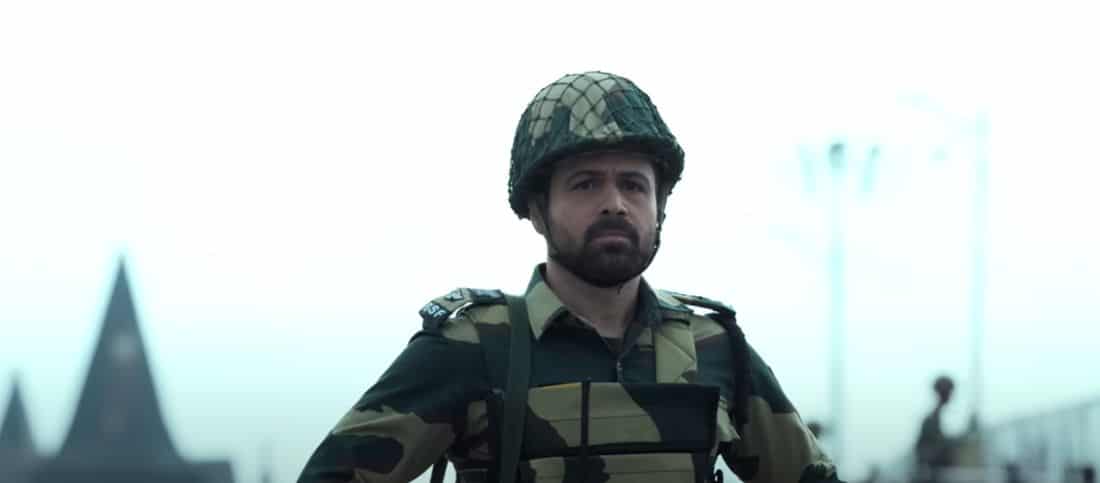In a time when Bollywood tends to walk the thin line between spectacle and substance, Ground Zero arrives with the assurance of both. Directed by Tejas Deoskar and led by a brooding Emraan Hashmi, the film’s recently released trailer has generated a wave of interest, and for reasons that are easy to see. This is not another hyper-patriotic action film; it’s a tense, emotionally charged, and refreshingly realistic adaptation of the true story of a soldier who commanded one of the most legendary anti-terror operations in Indian history.
Emraan Hashmi: A Career-Altering Makeover
Emraan Hashmi, erstwhile poster boy of edgy romance and dark thrillers, has been overhauled before. With Ground Zero, he appears to be discarding the last vestiges of his initial image, fully embracing the role of BSF Commandant Narendra Nath Dhar Dubey—a character whose legacy permeates the very ethos of Indian counter-terrorism operations. The trailer suggests a performance filled with gravitas and inner turmoil, indicating that Hashmi has found a new affective register. If the movie meets the potential of its trailer, this would be a defining performance in his career that puts him on the same pedestal as contemporaries such as Manoj Bajpayee and Vicky Kaushal, who’ve established critical success playing parts combining vulnerability with nationalist valour.
A Narrative Grounded in Realism, Not Rhetoric
The reason Ground Zero becomes fascinating right off the bat is due to its commitment to reality. Driven by the true mission that resulted in the killing of Ghazi Baba, one of India’s most feared terrorists, the film rejects chest-thumping jingoism for a subtler, more human exploration of a soldier’s quest. Dubey, awarded the Kirti Chakra in 2005, is not portrayed as a mythical being but as an individual fighting outside forces as well as his inner demons. This conflict is where the movie gets its emotional center, and the trailer shows us enough to realize that this isn’t about war for glory—it’s about sacrifice, strategy, and the high cost of duty.
The storytelling, it appears, is multifaceted—moving beyond action to examine the psychological cost that such missions impose. Glimpses into Dubey’s personal life—his interactions with family, his inner vulnerabilities—remind the viewer that the uniform is also accompanied by emotional baggage, and not merely battlefield valour. It is storytelling that knows the difference between a hero and a human being.
Cinematography and Setting: Kashmir as Character
Shot extensively on location in actual conflict-sensitive areas, the visual landscape of Ground Zero is rough, bleak, and engrossing. The Kashmir valley is not just a setting; it is a personality in itself—beautifully haunting, politically unstable, and emotionally charged. The cinematography gets its snow-laden silence as well as its explosive volatility across. Each frame is tense, abetted by a color tone that is moody and a quasi-documentary approach reminiscent of the realism of Haider and Uri but with its own flavor.
There’s a careful restraint in the visual language—no extra stylized movement, no glamorization of conflict. Rather, there’s an emphasis on immediacy and presence, drawing the viewer in so that they feel as though they’re right there in the midst of it all. The trailer plays into this atmospheric realism, providing a viewing experience that’s both intimate and intense.
Action with a Conscience
In a genre where action is usually equal to slow-motion heroics and impossible stunts, Ground Zero seems to aim towards a more strategic look. The clips presented in the trailer are crisp, utilitarian, and faithful to actual combat military manoeuvres. This isn’t spectacle—it’s strategy. And that’s precisely where the movie diverges.
What lends these sequences greater intensity is the emotional context in which they exist. Every bullet that’s fired, every door that’s kicked in, is tinged with moral compromise. The film recognizes that soldiers don’t only fight enemies—they’re operating in a world full of political overtones, civilian consequences, and moral sacrifice. This injects a sense of psychological richness hardly found in mainstream war cinema.
Supporting Cast: Layering the Narrative
Supporting Emraan Hashmi is an impressive cast: Sai Tamhankar, Mukesh Tiwari, and Zoya Hussain. Each seems to play a role that symbolizes various aspects of the Kashmiri conflict. From a civilian searching to survive amid suspicion, or an officer confronting his own allegiance, or the relative left to wait—such characters assure of providing depth and substance to what otherwise might be a one-sided patriotic film.
This multi-lens strategy proposes a commitment to narrative that is nuanced instead of convenient. Just like The Hurt Locker or Zero Dark Thirty, Ground Zero appears to be trying to achieve a mosaic of experience that captures the nature of war without simplifying it into binaries.
A Director with Vision
Tejas Deoskar is not yet a name to reckon with in the pan-India filmmaking universe, but with Ground Zero, he’s making a bid to become known as a serious and skilled director. Familiar with using strong visual narrative and humanist subjects, Deoskar seems to have infused the film with a clear authorial voice. He’s not content merely to tell the story—he needs to make people experience the story. If the trailer is to be believed, his direction will most certainly be characterized by a subtle tension between action and reflection, between the outward strife and inner strife.
Music and Sound: Sounds of Conflict
The background music in the trailer must be noted. It’s not the bombastic stuff that’s normally used with movies in this category. Instead, it incorporates silence as efficiently as it uses sound, such that moments of fear and despondency find time to catch up. Music swells to the right emotional moments but never overpowers—a testament to prudent sound design appreciating the importance of restraint.
Production Powerhouse
With Ritesh Sidhwani and Farhan Akhtar of Excel Entertainment in charge, Ground Zero gains the advantage of producers who have been proven to deliver films that balance quality with commercial success. That in itself is a big assurance that the film will not sacrifice content for the sake of mass marketability. The co-producers—Kassim Jagmagia, Vishal Ramchandani, Sundeep C Sidhwani, Arhan Bagati, Abhishek Kumar, Nishikant Roy, and Talisman Films—provide additional muscle to the credibility of the film, suggesting a collaborative effort based on common creative conviction.
The Emotional Undercurrent
What really lifts the Ground Zero trailer is its emotional undercurrent. The glimpses of waiting families by the telephone, the fleeting but intense flashbacks of uncertainty in the eyes of the protagonist, and the general atmosphere of a man who is caught between a sense of obligation and individual longing—these all add to a story that promises to resonate on a different level. It’s not about the body count or the success of the mission; it’s about what it costs to serve in the uniform and remain human.
A Much-Needed Evolution in the War Film Genre
Bollywood’s military and war genre has come a long way over the past decade. Border and LOC Kargil provided scale and emotion; Uri provided precision and punch. And now, Ground Zero seems poised to take it all further, providing a war movie that boldly explores its own introspection, ethical depth, and realism. It reflects on the nuances of nationalism, duty, and humanity without compromising any one of them.
Set for release on April 25, Ground Zero is already generating strong pre-release buzz—and not just because of its patriotic theme. It’s being talked about as a film that could redefine Emraan Hashmi’s trajectory and reinvigorate the war drama genre with a potent mix of realism and emotion.
For film enthusiasts who hunger for something more than skin-deep thrills, Ground Zero may well be one of the most satisfying cinematic experiences of 2025. And for those who’ve seen Indian cinema grow up—from melodramatic nationalist epics to complex, mature storytelling—this movie may be the next big benchmark.

This review is contributed by Mubeen Farooqi – Chief Business Manager – Spicetree Digital Agency, a leading creative design agency in Mumbai, with an office in Dubai. Mubeen Farooqi has written the dialogue for India’s biggest 3D Animation-Live Action film “Toonpur Ka Superrhero”, featuring Ajay Devgn and Kajol, and the scripts for the social media plotagraph promos of the landmark folk horror film “Tumbbad”. He has also written the scripts of brand and social cause films. He is a self-confessed film and music buff and writes regularly on all aspects of entertainment













